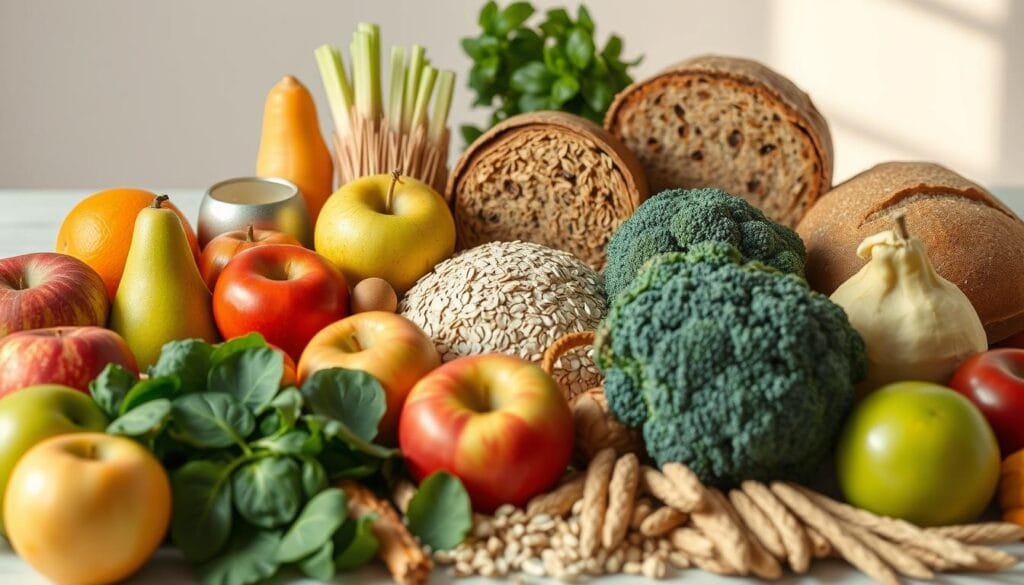Currently Empty: RM0.00
Digestive discomfort affects millions, but nature offers simple solutions. Certain fruits work like gentle remedies to support bowel movements and improve gut health. Packed with fiber, enzymes, and hydration, they help relieve constipation naturally.
Wellness Concept, a trusted authority in digestive wellness, recommends six evidence-backed options. Prunes act as a natural laxative, while kiwis contain actinidin to boost motility. Apples and pears soften stool with pectin and water. Citrus fruits add flavonoids for digestive ease.
Need personalized advice? Contact Wellness Concept via WhatsApp at +60123822655. Their Malaysian team is available Mon-Fri (9:30am-6:30pm) and Sat-Sun (10am-5pm).
Key Takeaways
- Prunes, kiwis, and apples top the list for easing digestion.
- Fiber-rich fruits promote regular bowel movements.
- Hydration from fruits like pears aids stool softening.
- Enzymes in kiwis enhance gut motility.
- Professional guidance is available via WhatsApp consultations.
Understanding Constipation and Its Causes
Millions struggle with irregular digestion, yet few understand its root causes. Medically, constipation means having fewer than three bowel movements weekly. It’s a common issue—16% of U.S. adults face it—but solutions start with awareness.
What Is Constipation?
When the intestines absorb too much water from stool, it becomes hard and difficult to pass. Acute cases last briefly, while chronic ones persist for weeks. Both disrupt daily life and overall digestion.
Common Symptoms of Constipation
Look for these signs:
- Pebble-like or lumpy stool
- Straining during bathroom visits
- Feeling bloated or uncomfortably full
- A sense of incomplete evacuation
How Diet Affects Bowel Movements
Western diets low in fiber and high in processed foods slow bowel movements. The gut-brain axis also plays a role—stress can disrupt digestive rhythms. Dehydration worsens things by reducing colonic transit speed.
Simple fixes? Eat more whole foods, drink water, and listen to your gut. Small changes often restore balance naturally.
The Role of Fiber in Relieving Constipation
Not all fiber works the same—understanding the difference can transform gut health. This dietary powerhouse comes in two forms, each with unique benefits for digestion. Whether adding bulk or forming gels, it’s a natural ally against sluggish bowel movements.

Soluble vs. Insoluble Fiber
Soluble fiber dissolves in water, creating a gel that softens stool. Found in oats, apples, and psyllium, it slows digestion to improve nutrient absorption. Insoluble fiber, like wheat bran and veggies, adds bulk to speed up transit.
Key contrasts:
- Soluble: Forms gel, feeds gut bacteria (e.g., pectin in citrus).
- Insoluble: Scrapes intestines, prevents blockages (e.g., celery, whole grains).
Recommended Daily Fiber Intake
Experts advise 25–38g daily, but Malaysians average just 15–20g. Local staples like jackfruit (3g/100g) and cempedak can help bridge the gap. Increase intake slowly to avoid bloating.
ASEAN fiber stats:
- Thailand: 18g/day
- Singapore: 20g/day
- Malaysia: Below regional average (Malaysian Dietary Guidelines 2023).
Pair high-fiber foods with water—it’s the combo that keeps digestion smooth. For personalized plans, consult a nutritionist via Wellness Concept’s WhatsApp line.
Top Fruits to Relieve Constipation
Nature provides powerful digestive aids in colorful, tasty packages. These six options combine fiber, hydration, and enzymes to help relieve discomfort gently. From prunes to citrus, each brings unique benefits for smoother bowel movements.
Prunes: Nature’s Laxative
Prunes offer 7.3g fiber per 100g—the highest among fruits. Their sorbitol content draws water into the intestines, while phenolic compounds stimulate contractions. Just 3–4 daily can soften stool effectively.
Apples: Rich in Pectin
Apples contain pectin, a prebiotic fiber that feeds gut bacteria. This gel-forming fiber adds bulk and slows digestion, ideal for irregularity. Eat with the skin for maximum benefit.
Pears: High in Water and Fiber
Asian pears (like nashi) are 84% water, great for hydration. European varieties pack more fiber—6g per medium fruit. Both types help relieve pressure by promoting motility.
Kiwis: Packed with Actinidin
Kiwifruit’s actinidin enzyme activates at body temperature, breaking down proteins for easier digestion. Studies show they improve stool consistency within days.
Figs: A Fiber Powerhouse
Dried figs provide 9.8g fiber per cup—perfect for occasional use. Soak them overnight to enhance their hydrating effects. Fresh figs work too but contain less concentrated fiber.
Citrus Fruits: Hydrating and Fibrous
Local favorites like pomelo and limau bali offer flavonoids and soluble fiber. Their high water content supports hydration, key for regular bowel movements.
Quick Smoothie Recipes
- Prune Power: Blend prunes, yogurt, and chia seeds.
- Green Reset: Kiwi, spinach, pear, and coconut water.
- Citrus Boost: Pomelo segments, mint, and flaxseeds.
Other Natural Remedies for Constipation
Beyond fruits, several natural solutions can support digestive wellness. Combining hydration, microbiome-friendly foods, and fiber-packed staples creates a holistic approach. These methods work synergistically to ease discomfort and promote regularity.
Hydration: The Importance of Water
Water is essential for softening stool and speeding up transit. Adults should aim for 30–35ml per kilogram of body weight daily. For a 70kg person, that’s 2.1–2.5 liters.
Supercharged hydrators like chia seeds absorb 12 times their weight in water, forming a gel that aids movement. Track intake with apps or marked bottles to stay consistent.
Probiotic-Rich Foods
Fermented foods introduce beneficial bacteria to the gut. Just 400ml of kefir weekly improves microbiome diversity. Malaysian options include:
- Tempeh: High-protein soy ferment
- Tapai: Glutinous rice with yeast
- Jeruk: Pickled fruits and veggies
Pair these with prebiotics (garlic, onions) to feed good microbes—a combo shown to enhance digestion.
Whole Grains and Legumes
Whole grains and legumes deliver insoluble fiber for bulk. Resistant starch in cooled potatoes also aids motility. Start slowly to avoid gas.
| Grain | Fiber (per 100g) | Local Dish Idea |
|---|---|---|
| Brown rice | 3.5g | Nasi lemak with cucumber |
| Barley | 17g | Bubur barli (porridge) |
| Lentils | 8g | Dhal curry with roti |
For legumes, soak overnight to reduce bloating. Gradually increase portions to let your digestive system adapt.
Foods to Avoid When Constipated
Diet plays a key role in digestive health, but some foods create roadblocks. While fiber-rich options help, others slow motility or harden stool. Identifying these culprits can prevent discomfort and restore balance.
High-Fat and Processed Foods
Fried dishes and packaged snacks delay digestion. Saturated fats in rendang or goreng pisang reduce intestinal contractions. Processed items like instant noodles often contain additives that disrupt gut rhythm.
Common Malaysian triggers:
- Teh tarik: Excess condensed milk adds saturated fat.
- Commercial kuih: Trans fats from margarine.
- Deep-fried proteins: Chicken skin, crispy anchovies.
Dairy Products
Dairy products, especially cheese, contain casein protein, which some bodies struggle to break down. This can lead to harder stool and bloating. Opt for lactose-free alternatives like soy yogurt if sensitive.
Unripe Bananas
Green bananas have resistant starch that may cause constipation. Wait until peels develop small brown spots—this signals ripeness and higher fiber content. Ripe bananas aid motility instead.
Quick swaps: Replace condensed milk with oat milk in drinks. Choose grilled over fried meats. These small changes keep digestion on track.
Lifestyle Tips for Better Digestion
Daily habits shape digestive wellness as much as dietary choices. While fruits provide essential fiber, consistent movement and stress management complete the picture for regular bowel movements. These three pillars work synergistically to maintain health from the inside out.

Move Your Body Daily
Physical activity stimulates intestinal contractions, promoting smoother movements. Even gentle Malaysian-friendly options make a difference:
- Qigong in parks: Morning sessions at KLCC or Penang Botanical Gardens
- Brisk walking: 30 minutes daily at Putrajaya Lakeside
- Traditional dances: Joget or zapin for core engagement
- Swimming: Low-impact laps at community pools
- Yoga stretches: Cobra pose specifically aids digestion
Sync With Natural Rhythms
The digestive system follows circadian patterns. Waking and meal schedules influence motility:
- Visit the bathroom 20-30 minutes after breakfast (when colon activity peaks)
- Limit late-night eating to prevent sluggish morning bowel movements
- Use smartphone reminders for consistent meal times
Squatting positions align the rectum optimally—try a small footstool if using Western toilets.
Calm the Mind, Soothe the Gut
Chronic stress triggers fight-or-flight responses that disrupt digestion. Proven local techniques include:
- T’ai chi: Free classes at PJ Community Centre
- Forest bathing: Weekend trips to FRIM or Penang Hill
- Digital detoxes: Reduce screen time before bed
For deeper support, consider probiotic supplements like those detailed in our gut health guide.
Conclusion
Managing digestive health becomes easier with the right knowledge and tools. Prunes, kiwis, and apples top the list to help relieve discomfort naturally. Combine them with hydration and movement for lasting results.
Seek medical advice if symptoms like blood in stool or severe pain persist. Wellness Concept offers expert guidance—contact their team via WhatsApp at +60123822655. Hours: Mon–Fri (9:30am–6:30pm), Sat–Sun (10am–5pm).
Start small. Swap processed snacks for fiber-rich options and track progress. For a free fiber intake calculator, message Wellness Concept today.
FAQ
What foods help with constipation?
High-fiber options like prunes, apples, pears, and whole grains promote regular bowel movements. Hydrating foods such as kiwis and citrus fruits also aid digestion.
How much fiber should someone eat daily to prevent constipation?
Adults need 25–30 grams of dietary fiber daily. Gradually increasing intake with fruits, vegetables, and whole grains helps avoid bloating.
Can probiotics improve gut health and relieve constipation?
Yes. Foods like yogurt, kefir, and fermented products support healthy gut bacteria, which may ease symptoms and improve stool consistency.
Are there fruits that worsen constipation?
Unripe bananas and persimmons contain tannins that slow digestion. Opt for ripe bananas or fiber-rich alternatives like figs instead.
Does drinking water help with constipation?
Absolutely. Proper hydration softens stools and supports digestion. Aim for at least 8 glasses daily, especially when increasing fiber intake.
How does exercise impact bowel movements?
Physical activity stimulates intestinal muscles, promoting regularity. Even a 30-minute walk daily can enhance digestive health.
Why do prunes work so well for constipation?
Prunes contain sorbitol, a natural laxative, and high fiber content. Together, they add bulk to stools and speed up bowel movements.
Can stress cause constipation?
Yes. Stress disrupts gut function. Techniques like deep breathing or yoga may help manage stress and improve digestion.



